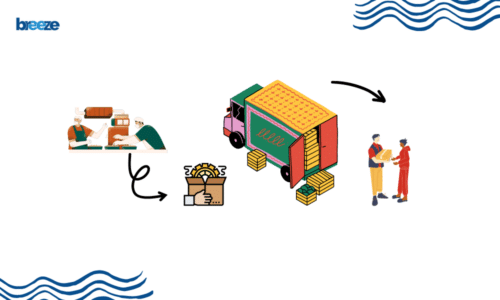- Breeze FSM
- Distribution, Field Sales Management, Inventory, Retail
- 0 Comments
- 3027 Views
Probably one of the most important issues for FMCG companies is that of managing a gigantic network of distributors and retailers. Highly effective DMS could be very handy in overcoming this challenge providing tools for inventory management, visit scheduling, claim processing, and management of supply chain functions. Let’s look at how DMS can transform the management of distribution for FMCG and consumer goods companies.
Understanding the Complexity of Emerging Markets
The number of thousands of distributors and millions of retailers spans billions of transactions in very vibrant and gigantic emergent markets. Hence, FMCG companies need to manage a complicated network of distribution with multiple channel partners where an ongoing and real-time view of the network is essential for achieving success.
In a competitive marketplace today, companies need full visibility into secondary sales, including details about the inventory and success of their promotional schemes. The response, therefore, is to optimize these operations, while cutting cost.
The solutions? Distributor Management Systems. Global companies look for big-scale implementation of DMS to guide their supply chains and make operational effectiveness.
What is a Distributor Management System?
Distributor Management System: It is an expert solution in software form to help streamline secondary sales management. All of the product distribution through distributors is managed and monitored in this system. This helps FMCG companies streamline all operations management, logistics, processing of sales orders, and analytics.
DMS offers the FMCG companies complete visibility along the entire supply chain from product manufacturing down to delivery at retail outlets.
Streamline, Optimize, and Succeed with BreezeFSM
- AI-powered Market Assistant
- Territory Mapping
- Activity Tracking
- Capturing and tracking leads
- Performance Insight
Role of DMS in Supply Chain Management
In FMCG, market share capture would be key distributor management. A DMS digitally designed well means smooth and automated sales processes of management in inventory, secondary smooth sales execution, scheme utilization of inventory, and smooth operations from manufacturing to delivery.
Generally, prime objectives of DMS are to surpass competitors by gaining improved visibility and efficiency in the entire chain of supply.
Consider a multi-national firm producing A, B, and C. When there are thousands of distributors and millions of customers demanding the same products, managing proper storage, inventory, and logistics delivery is a mammoth task. DMS here ensures smooth operations and timely delivery.
Benefits of DMS Over Other Ordinary Systems
-
- Real-Time Visibility into Sales FMCG companies used to wait for data collection from distributors. DMS now enables real-time secondary sales executions so that better decisions are made.
-
- Inventory Management: DMS shows sales and stock in hand immediately, so the efficient management of inventory can be done. This leads to proper availability of the product without overstocking and understocking.
-
- Enhanced Productivity and Reduced Costs DMS decreases operational costs because it reduces the usage of extra workstation workstations and personnel. It also decreases losses created by revenue on pilferage and damage.
-
- Time Management Streamlined operations help the organization manage to spend more time on strategy and innovation, rather than day-to-day sales-related activities.
Challenges in adopting a DMS Despite the benefits, many FMCG companies face problems in the implementation of a DMS. The biggest challenge here is to get the distributors to implement the system. Most distributors handle a large number of brands and find it convenient to use one management system for all their transactions rather than handling different software for each brand.
This behavior creates secondary sales data visibility gaps for FMCG companies. Also, because it doesn’t sync up with the cloud, the gathering of data gets further delayed; usually, by the end of the month.
Solving the Problems
The solution to these challenges lies in embracing a Hybrid DMS. A hybrid system integrates into the distributor’s already existing software, such as Tally, allowing them to continue working with tools familiar to them. In parallel, FMCG companies can now have a handle on their visibility of secondary sales, which means optimal inventory management.
With this cloud-based solution, distributors will be able to collect data from their preferred systems and share that information immediately with the FMCG company.
The benefit of BreezeFSM
BreezeFSM gives the companies competing advantages over them in upgrading distributor management.
Web-Based Operations: These operations can be managed both on the computer and on a mobile phone, hence considered flexible.
Seamless Integration: BreezeFSM integrates with existing systems, making it easier for distributors to adopt without changing their workflows.
Centralized Sales Management Solution BreezeFSM: It integrates SFA with DMS; hence, it gives truly real-time information regarding the sales execution process.
Conclusion: Great Leap in FMCG Sales with BreezeFSM
A DMS is a very crucial tool for FMCG companies to standardize secondary sales and get better control over their supply chains. However, it is not so easy to get distributors on board with a DMS. Thus, BreezeFSM, which is a hybrid solution of total integration with the existing systems, empowers companies to view their sales before optimizing. Want to see how BreezeFSM can help your FMCG business? Get a free demo today!





